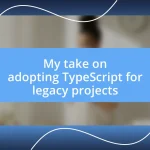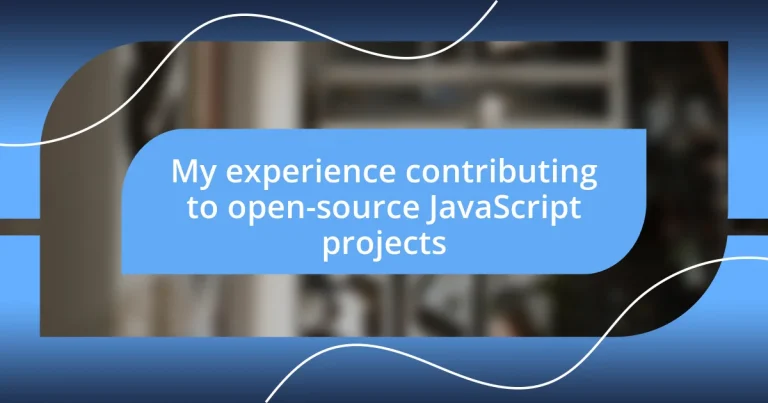Key takeaways:
- Engaging in open-source projects fosters a sense of community, skill development, and networking opportunities, enhancing personal and professional growth.
- Selecting the right project requires aligning personal interests with project goals, assessing activity levels, and ensuring quality documentation for effective contributions.
- Collaboration enhances learning and creativity, while sharing experiences and embracing vulnerability promote connection and knowledge within the open-source community.
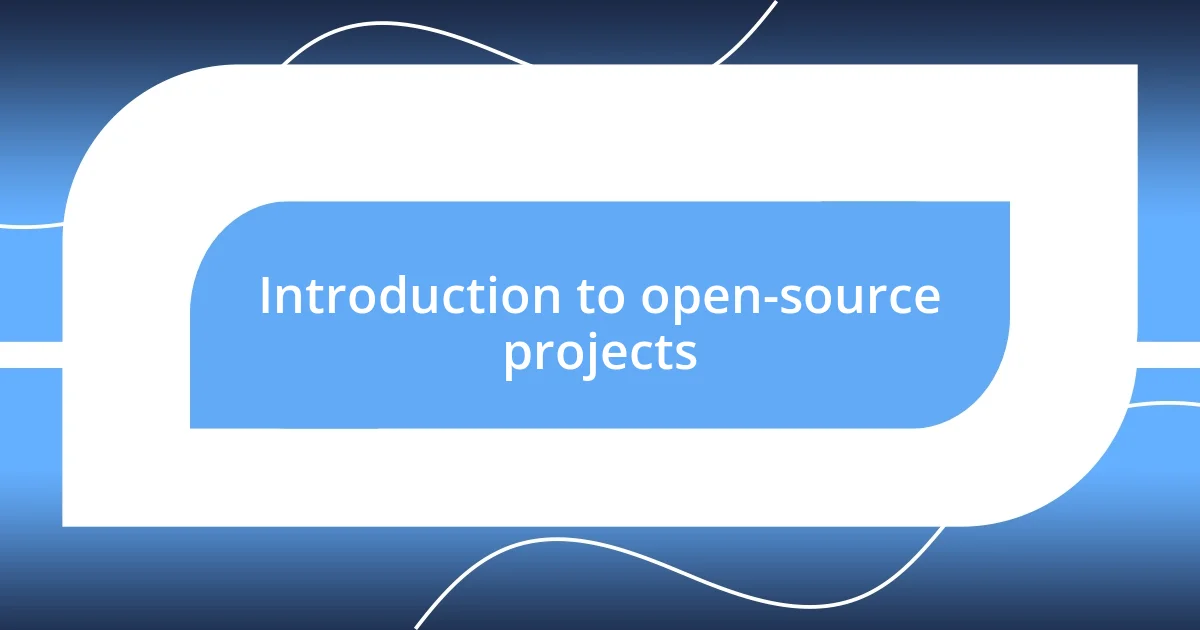
Introduction to open-source projects
Open-source projects are fascinating collaborations where developers from around the world come together to create, modify, and enhance software freely. I remember the exhilaration I felt when I first contributed to one; it was as if I had opened a door to a community brimming with creativity and innovation. Can you imagine being part of a global effort where your code could potentially help thousands, if not millions, of users?
Engaging with open-source lets you learn from experienced developers while contributing your own unique skills. I often found myself tackling challenging bugs, and with each fix, my confidence grew. It’s intriguing how a simple pull request can turn into a learning experience that enriches not just your coding abilities but also your understanding of collaborative problem-solving.
In the world of open-source, the possibilities are endless. By allowing anyone to use, study, and change the software, we foster an environment teeming with shared knowledge and improvement. Have you ever pondered how your individual contributions might flow back into this vast ecosystem? It’s empowering to think that, together, we can shape the future of technology—one line of code at a time.
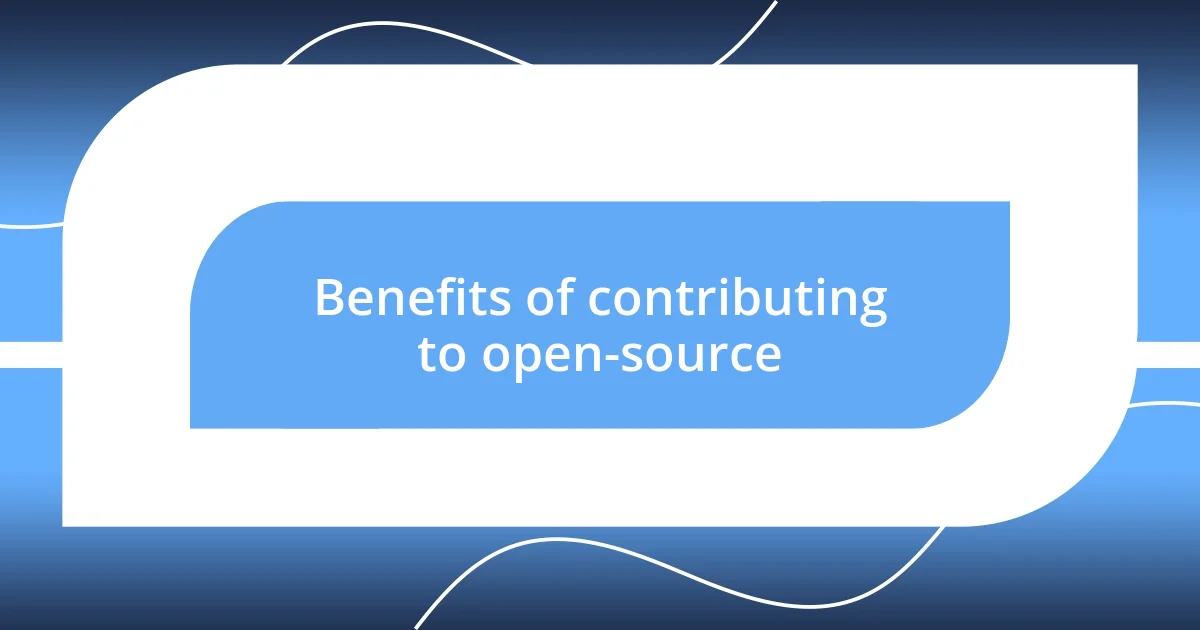
Benefits of contributing to open-source
Contributing to open-source projects has numerous benefits that transcend just coding. The sense of community and connection you build along the way is incredibly rewarding. I still remember the thrill of receiving positive feedback on my first pull request. It felt like a badge of honor, validating my work and pushing me to continue improving. Being a part of a team that shares knowledge fosters a culture of learning that’s difficult to replicate in traditional environments.
Here are some key benefits of contributing to open source:
- Skill Development: You have the opportunity to learn new technologies and improve your coding skills in a real-world context.
- Networking: Working with others in the community can lead to connections that may benefit your career.
- Impactful Contribution: Your efforts can make a difference in the lives of users worldwide, which is immensely fulfilling.
- Portfolio Growth: Contributions enhance your portfolio, showcasing practical experience to potential employers.
- Feedback and Recognition: You get constructive feedback from experienced developers, boosting your confidence and expertise.
Each of these aspects can create opportunities that go beyond just writing code, opening doors to collaborations and friendships that can last a lifetime.
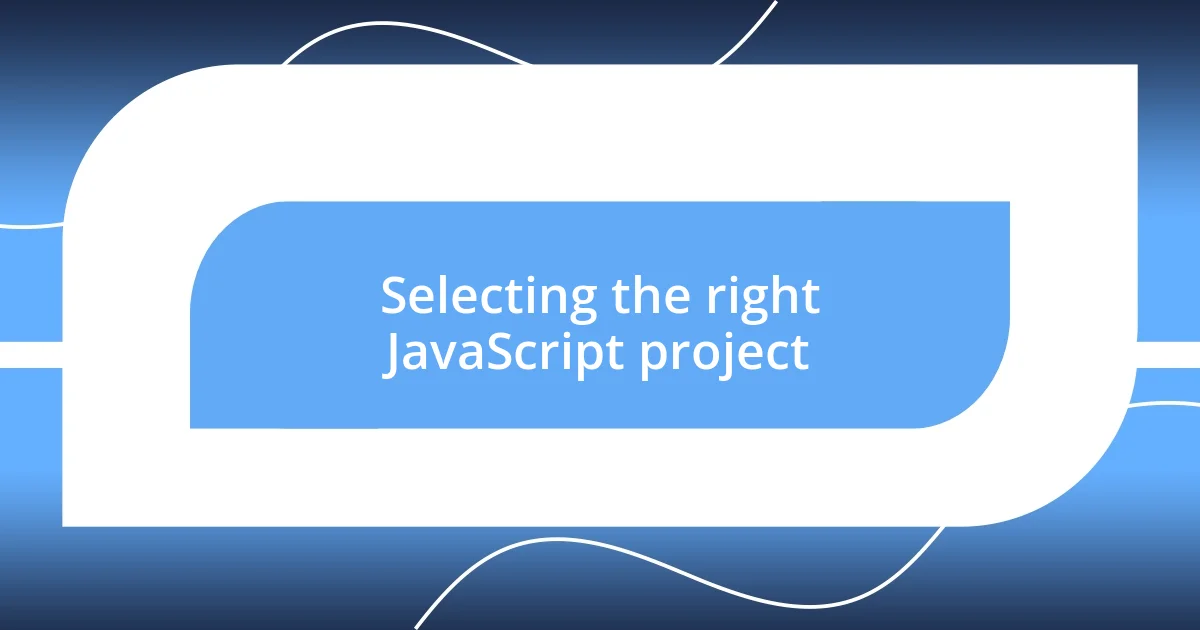
Selecting the right JavaScript project
Selecting the right JavaScript project can be a game-changer in your open-source journey. I remember scrolling through repositories, feeling that mixture of excitement and hesitation. One thing I learned quickly is to align your skills and interests with the project’s goals. If you have a passion for web accessibility, look for projects focused on inclusive design; your contributions will resonate deeply with the community and yourself.
Another key factor to consider is the level of activity within the project. I’ve flooded my GitHub notifications with dead repositories before, which can feel disheartening. A vibrant project often means numerous contributors and frequent commits, providing you with enough support and learning opportunities. So, keep an eye on the latest activity; it often reflects the project’s vitality and engagement level.
Lastly, the project’s documentation plays a crucial role in your selection process. I can recall joining a project with an expansive, but poorly structured document that left me more confused than informed. Clear and concise documentation not only facilitates smoother onboarding but also fosters a welcoming environment for new contributors. Ensuring the documentation is up to par can save you a lot of time and frustration.
| Consideration | Importance |
|---|---|
| Alignment with Skills and Interests | Ensures personal investment and meaningful contributions. |
| Project Activity Level | Indicates vibrancy and support availability. |
| Quality of Documentation | Determines ease of onboarding and understanding. |
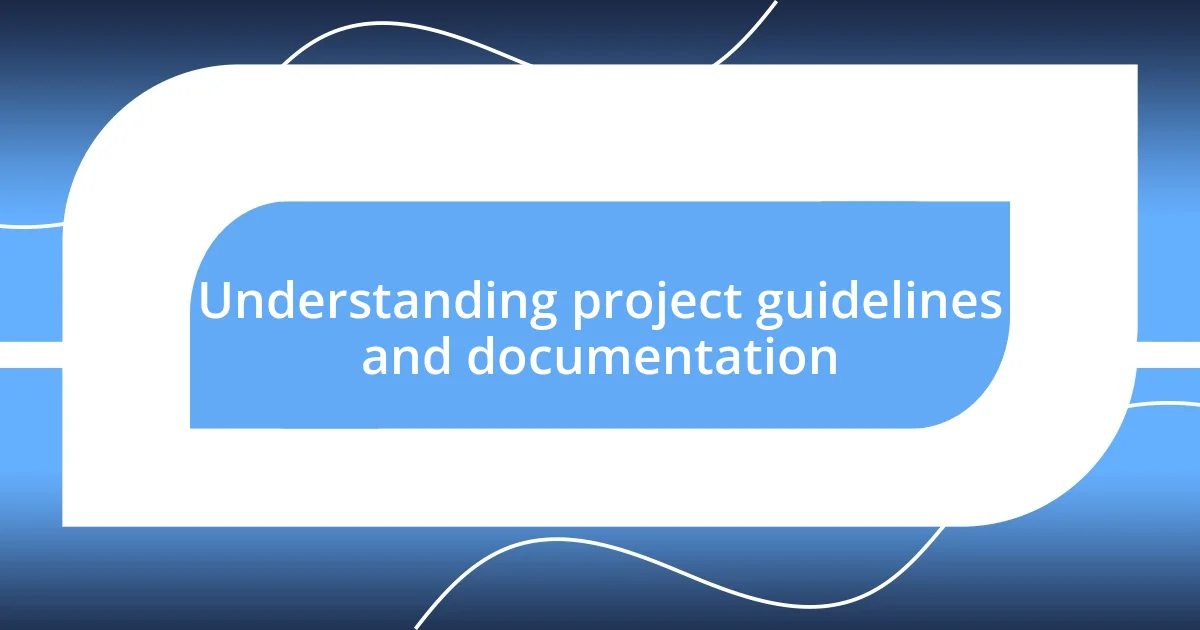
Understanding project guidelines and documentation
When I first dove into open-source projects, understanding the project’s guidelines and documentation was my guiding star. I remember cracking open the README file of a project, anxious yet excited. The clarity of those initial instructions made all the difference; it felt like having a friendly map during a challenging hike. Clear guidelines help set expectations and define the road ahead, making it essential for any new contributor.
It’s not just about reading; it’s about absorbing those nuances. I’ve seen projects where the guidelines were incredibly well-organized and easy to follow, allowing me to contribute quickly and confidently. On the flip side, I’ve also encountered documentation that was filled with jargon and vague instructions. That confusion? It can lead you to a frustrating dead-end and rob you of the motivation to keep trying. It’s worth digging into these documents thoroughly before starting your first task.
Engagement with the documentation often sparks questions, too. For instance, I’d find myself wondering about specific coding standards and practices. Each time I reached out to the maintainers for clarification, it became a learning moment. The experience reminded me that asking questions not only clarified my understanding but also strengthened my connection with the project community, creating an environment where collaboration thrives. So, how do you feel about digging into a project’s guidelines? Are they just a checkbox for you, or do they actually inspire you to get involved?
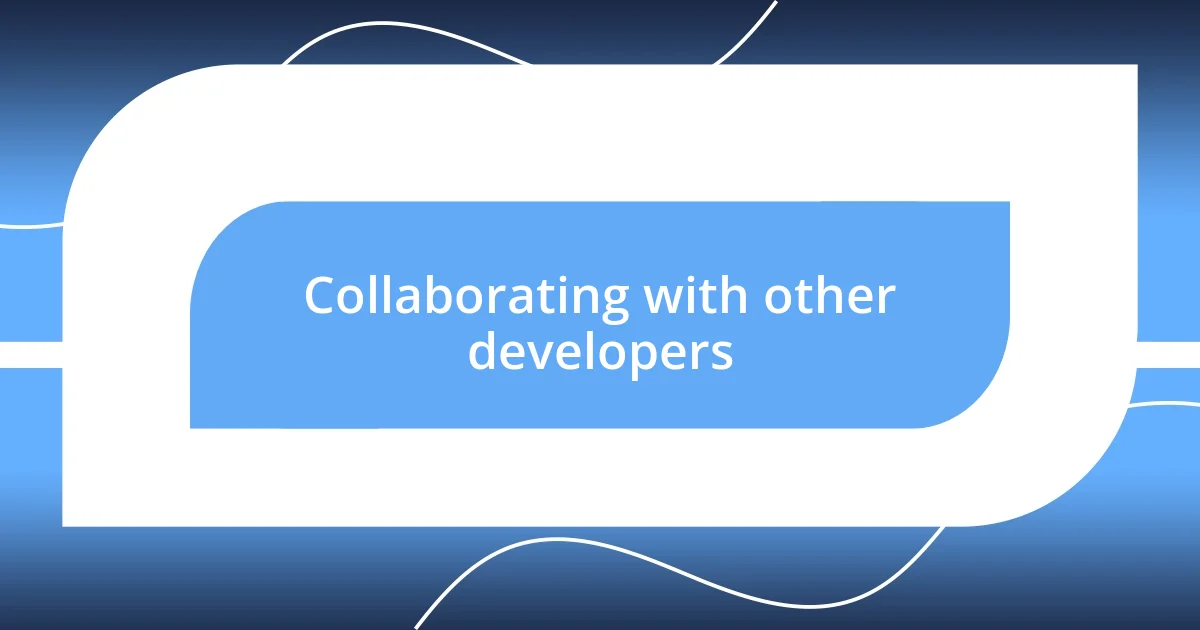
Collaborating with other developers
Collaboration with other developers in open-source projects has truly transformed my coding experience. I recall my first pull request; it was nerve-wracking to think about how seasoned developers would perceive my contribution. The feedback I received, though, was constructive and encouraging. It made me realize that collaboration is not just about merging code but about exchanging ideas and learning from one another.
I’ve also discovered that communication plays a central role in successful collaboration. One memorable instance was when I worked on a feature with a team from different countries. We faced time zone challenges but used platforms like Slack to maintain an ongoing dialogue. That constant communication not only clarified project objectives but also fostered friendships that extended beyond lines of code. How could we foster such bonds without regular interaction?
Moreover, I learned that being open to critique can significantly enhance the collaborative process. Initially, I took feedback personally, feeling a pang of disappointment. However, I soon understood that constructive criticism was an opportunity for growth. The moment I shifted my perspective, it felt liberating; I could refine my skills while contributing to something greater. Isn’t it fascinating how collaboration can accelerate our development as programmers?
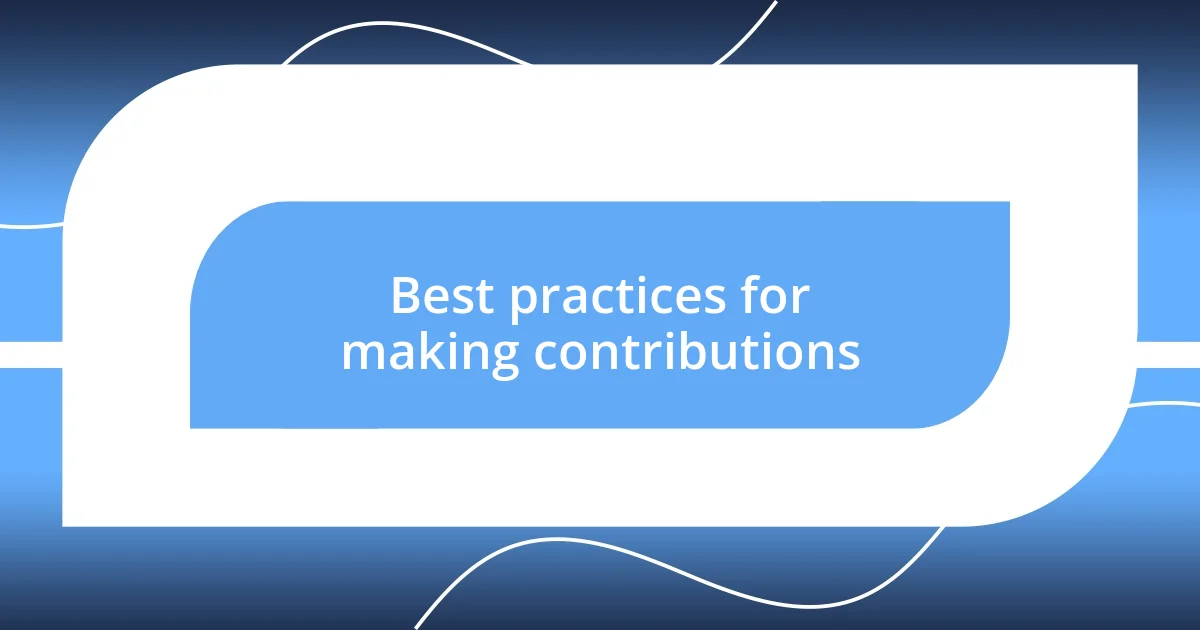
Best practices for making contributions
When it comes to making contributions, following established coding standards is crucial. I remember the first time I encountered a style guide. It felt a bit tedious to format my code just so, but adhering to those standards was like learning a new language – it became second nature. Consistency in code not only makes it easier for everyone to follow along, but it also shows respect for the project and its community. Have you ever noticed how a clean codebase improves collaboration?
Don’t underestimate the power of testing your code before submission. I once overlooked this step, believing my solution was perfect. After sending off my pull request, I was kindly reminded by a maintainer that automated tests are there for a reason. This experience taught me that thorough testing not only safeguards the project’s integrity but also builds trust among contributors. Isn’t it amazing how a few extra minutes can save hours of back and forth?
Lastly, maintaining a humble approach and being receptive to others’ ideas can radically change your experience. I distinctly remember being part of a brainstorming session where I suggested a feature that, to my surprise, sparked a whole new direction for our project. Engaging actively and being open to input encouraged a dynamic that was both inspiring and enriching. How often do we give ourselves the chance to be vulnerable, knowing it could lead to greater creativity?
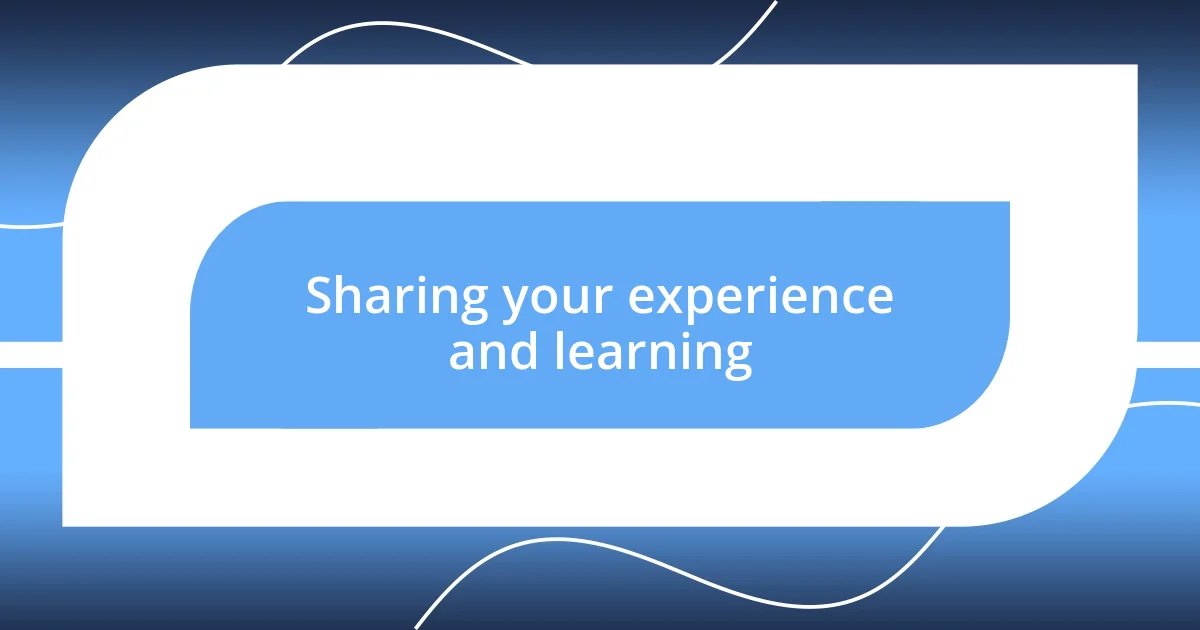
Sharing your experience and learning
Engaging with the open-source community has been incredibly rewarding for my personal growth. I vividly remember sharing a small tutorial on an obscure JavaScript function I stumbled upon during my coding journey. To my surprise, fellow contributors not only appreciated it but also expanded on my ideas, turning that initial post into a collaborative knowledge-sharing thread. Isn’t it rewarding when your experience turns into a springboard for others?
Learning from others’ experiences has shaped my own understanding in profound ways. One time, I attended a virtual meetup where a developer shared their approach to debugging—a technique I had never considered. After trying it out, not only did I resolve a stubborn issue, but I also felt a deeper connection to the community. Have you ever experienced that spark of inspiration that completely shifts your perspective?
Every time I share my knowledge or seek help, I’m reminded of the power of vulnerability in learning. I recall hesitating to ask a seemingly simple question in a project discussion, fearing it might expose my inexperience. When I finally mustered the courage, the response was warm and full of supportive advice. That moment taught me that embracing our uncertainties is essential to growth. How often do we let fear hold us back from valuable insights?







